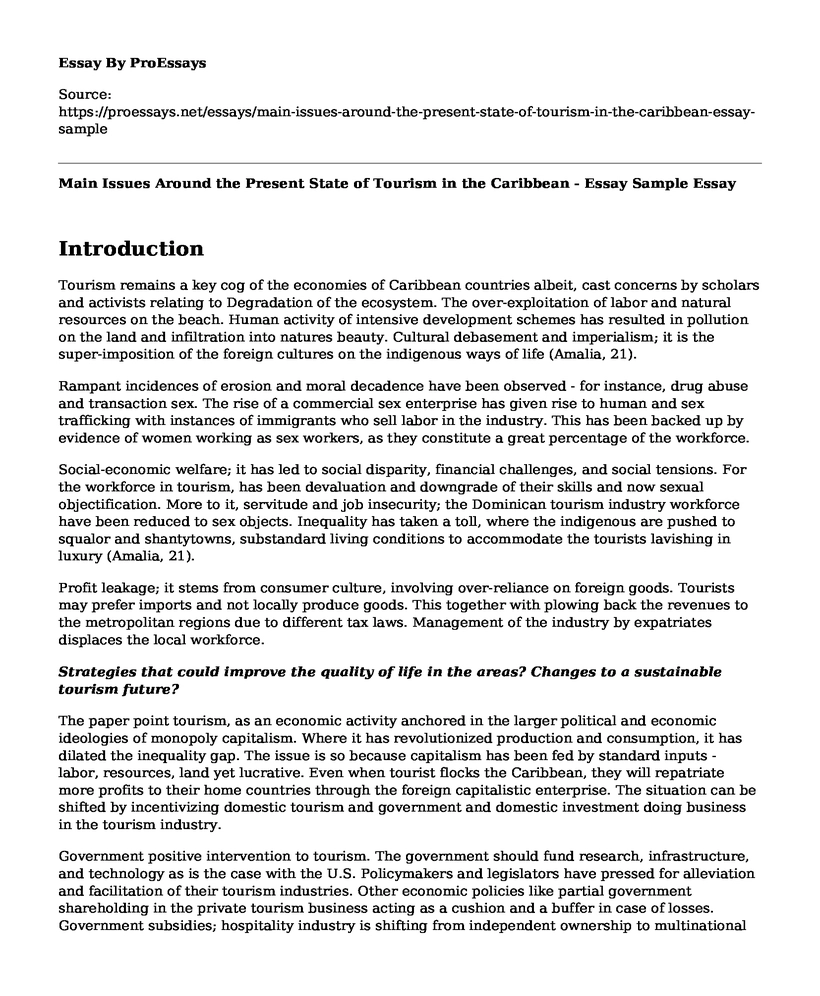Introduction
Tourism remains a key cog of the economies of Caribbean countries albeit, cast concerns by scholars and activists relating to Degradation of the ecosystem. The over-exploitation of labor and natural resources on the beach. Human activity of intensive development schemes has resulted in pollution on the land and infiltration into natures beauty. Cultural debasement and imperialism; it is the super-imposition of the foreign cultures on the indigenous ways of life (Amalia, 21).
Rampant incidences of erosion and moral decadence have been observed - for instance, drug abuse and transaction sex. The rise of a commercial sex enterprise has given rise to human and sex trafficking with instances of immigrants who sell labor in the industry. This has been backed up by evidence of women working as sex workers, as they constitute a great percentage of the workforce.
Social-economic welfare; it has led to social disparity, financial challenges, and social tensions. For the workforce in tourism, has been devaluation and downgrade of their skills and now sexual objectification. More to it, servitude and job insecurity; the Dominican tourism industry workforce have been reduced to sex objects. Inequality has taken a toll, where the indigenous are pushed to squalor and shantytowns, substandard living conditions to accommodate the tourists lavishing in luxury (Amalia, 21).
Profit leakage; it stems from consumer culture, involving over-reliance on foreign goods. Tourists may prefer imports and not locally produce goods. This together with plowing back the revenues to the metropolitan regions due to different tax laws. Management of the industry by expatriates displaces the local workforce.
Strategies that could improve the quality of life in the areas? Changes to a sustainable tourism future?
The paper point tourism, as an economic activity anchored in the larger political and economic ideologies of monopoly capitalism. Where it has revolutionized production and consumption, it has dilated the inequality gap. The issue is so because capitalism has been fed by standard inputs - labor, resources, land yet lucrative. Even when tourist flocks the Caribbean, they will repatriate more profits to their home countries through the foreign capitalistic enterprise. The situation can be shifted by incentivizing domestic tourism and government and domestic investment doing business in the tourism industry.
Government positive intervention to tourism. The government should fund research, infrastructure, and technology as is the case with the U.S. Policymakers and legislators have pressed for alleviation and facilitation of their tourism industries. Other economic policies like partial government shareholding in the private tourism business acting as a cushion and a buffer in case of losses. Government subsidies; hospitality industry is shifting from independent ownership to multinational hotel chains. Strategic alliances; Multinational corporations and businesses have tended toward forming a monopoly with the player in other industry like credit and banking, hotel business, travel companies, and even media and film (Amalia, 23). There have been mergers and evolution to transnational industries. This has led to market domination and profits due to economies of scale, and global marketing and branding. They influence customer choice and negotiate on the best deals and flexible packages for their tourists.
Sustainable Tourism
The sustainability will involve the participation of the nation in direct control of the tourism sector. As such domestic tourism and government regulation in the tourism will escalate and perhaps, bring forth the nationalization of the tourism industry, translating to more revenue and income for the country.
Equally important, is cutting on over-dependence on tourism. Diversified economies that seek to put all eggs in different baskets will exist.
Works Cited
Amalia L. Cabezas. Tropical Blues: Tourism and Social Exclusion in the Dominican Republic. Latin American Perspective. Vol. 35, No. 3. The Impact of Tourism in Latin America. 2008. Print.
Cite this page
Main Issues Around the Present State of Tourism in the Caribbean - Essay Sample. (2022, Dec 05). Retrieved from https://proessays.net/essays/main-issues-around-the-present-state-of-tourism-in-the-caribbean-essay-sample
If you are the original author of this essay and no longer wish to have it published on the ProEssays website, please click below to request its removal:
- The Impact of Climate Change on Winter Tourism in the Swiss Alps
- Research Paper on Impacts of Hosting Mega Sporting Activity
- Development Plan for the West Bay North Beach - Paper Example
- Essay Sample on Cross-Cultural Communication in Tourism: Challenges and Solutions
- Paper Example on Technological Innovation: Transforming Lives and Shaping the Future
- Essay Example on Explore the World's Wonders on a Cunard Cruise!
- Essay Example on Philadelphia: Leveraging History to Increase Tourist Numbers







